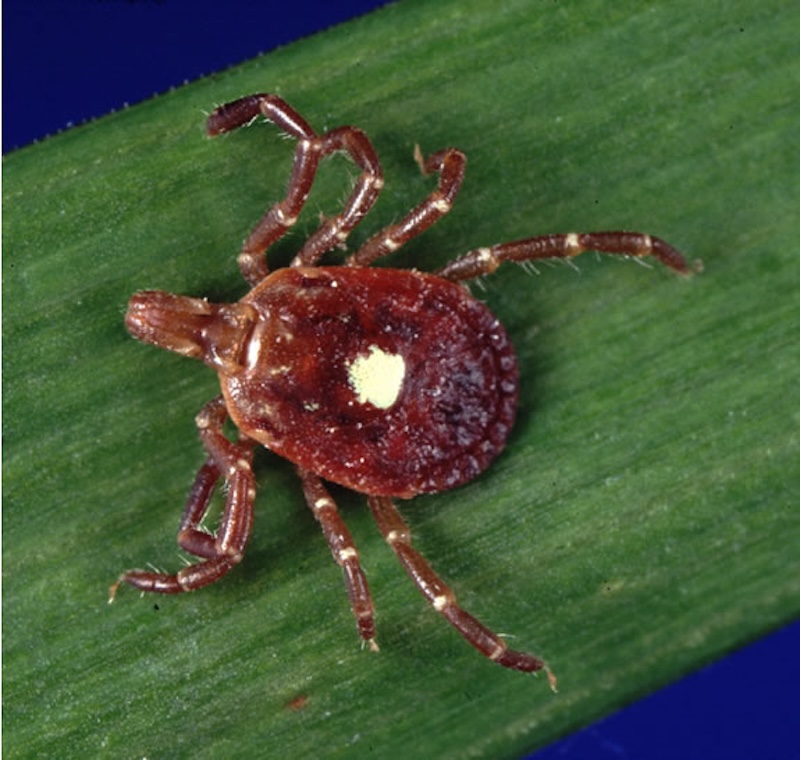There is a new pest to watch out for. Lone star ticks are taking advantage of our rising temperatures and moving northward. They are reproducing rapidly and have been found as far north as Maine. An entomologist and disease specialist at Cornell University believes that due to their adaptability and the rising temperatures, there are no limits to the spread of these ticks. Growing numbers of deer and rabbits, which host these and other ticks, are also putting us at risk. Yes, those cute little bunnies could be carrying these ticks and depositing them on our lawns. Unfortunately, these ticks are native to the US and there is not much to stop them.
Experts are warning that lone star ticks could infect millions of people with a disease called alpha-gal syndrome. Cases of alpha-gal syndrome have risen dramatically as these ticks have spread. Alpha-gal syndrome has grown from just a few dozen cases in 2009 to as many as 450,000 today. The exact number of alpha-gal cases is unclear due to poor data collection and undercounting. Experts expect this allergy to grow as lone star ticks proliferate. They predict that alpha-gal could end up affecting millions of people.
If you have a dog and use three-month tick protection, be aware that the protection only lasts for two months for lone star ticks.
Like all ticks, lone star ticks are gross. But these are especially heinous because they can trigger alpha-gal syndrome, a bizarre allergy to red meat and dairy.
I was at a dinner with a friend who was infected with alpha-gal syndrome from a lone star tick. She discovered this little guy last year and had no idea the trauma that he would bring. Within several hours of eating red meat, dairy or a by-product, she breaks out in a blotchy skin-like-hives that are excruciatingly painful. Alpha-gal syndrome also increases the risk of heart attacks. Eventually many sufferers experience anaphylactic shock while consuming red meat, dairy, or a by-product.
It is not as simple as avoiding red meat and dairy, she explained that by-products are everywhere. For example, she can no longer take capsules as the capsule itself is made from a by-product.
Alpha-gal is a confounding condition because it doesn’t cause an immediate allergic reaction. Symptoms often appear hours after consumption. The syndrome is not caused by a pathogen introduced by the tick, but the tick’s bite creates an allergy to a sugar molecule found in red meat and dairy. Researchers think the condition could lessen over time, but it gets worse if there are additional tick bites.
Since it is relatively new and confusing syndrome, medical professionals may be unaware of the condition and may be unable to diagnose it properly. In the case of my friend, she was diagnosed by an allergist directly out of medical school, who recognized the symptoms and tested for alpha-gal syndrome.
My friend asked me to spread the warning. If you are experiencing these symptoms, be aware and report this to your medical professional. This syndrome is growing rapidly, yet still relatively rare in our area, and medical professionals may prescribe doxycycline believing it to be Lyme disease.
Lone star ticks are aggressive bugs that actually follow human and animal targets if they detect them. In other words, they will hunt you down. There is also the prospect of brushing up against vegetation containing a massed ball of juvenile lone star ticks, known as a “tick bomb”, that can deliver thousands of tick bites. They are too tiny to be seen.
It is not known why the bite of lone star ticks suddenly started causing these allergic reactions. Cases have been found in Europe and Australia, although in low numbers. It is predicted that other tick species including deer ticks might also spread alpha-gal syndrome.
There is no cure for this condition at this time. The current treatment is antihistamines. Sufferers must refrain from red meat and dairy, take antihistamines daily and carry EpiPens in case they go into anaphylactic shock.
Let’s face it, ticks are not our friends (or friends of our animals). They spread Lyme disease, alpha-gal syndrome and other rare but dangerous diseases. So be careful out there!
Angela Rieck, a Caroline County native, received her PhD in Mathematical Psychology from the University of Maryland and worked as a scientist at Bell Labs, and other high-tech companies in New Jersey before retiring as a corporate executive. Angela and her dogs divide their time between St Michaels and Key West Florida. Her daughter lives and works in New York City.



Write a Letter to the Editor on this Article
We encourage readers to offer their point of view on this article by submitting the following form. Editing is sometimes necessary and is done at the discretion of the editorial staff.